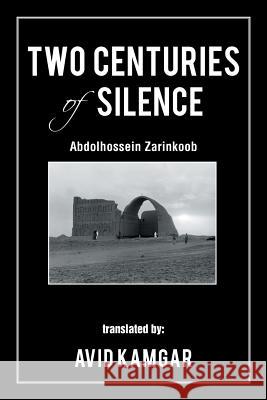Two Centuries of Silence » książka
Two Centuries of Silence
ISBN-13: 9781524622534 / Angielski / Miękka / 2016 / 308 str.
Two Centuries of Silence
ISBN-13: 9781524622534 / Angielski / Miękka / 2016 / 308 str.
(netto: 91,21 VAT: 5%)
Najniższa cena z 30 dni: 94,72
ok. 16-18 dni roboczych.
Darmowa dostawa!
How Farsi language broke its two centuries of silence. This book is the translation of Do Gharn Sokoot, into English by an Iranian scientist and scholar. Two Centuries of silence is the saga of 200 years of struggle by Iranians in order to free themselves from the yoke of Muslim Arabs- elegantly and passionately told by Abdolhossein Zarinkoob. The book elucidates the key reasons for the success of Muslim Arabs in their assault on Iran- a fact that was not written in the stars, nor was it an act of God. For its readers, this translation hopes to shed light on what forms the foundation of today's Iran and help bring some understanding of Iranians and their culture. The fall of Nahāvand in 642 CE marked the end of a glorious fourteenth-century history of Iran-a fascinating and dynamic history spanning the years from 700 BCE to 700 CE. For two centuries thereafter, a brutally long, chilling silence cast its shadow over the history and language of Iran. Professor Zarinkoob explores the reason behind the Sasanian downfall and how the uncouth Bedouins triumphed over an immense and glorious civilization such as that? During these two centuries- about which our recent historians have remained silent-why did Farsi become a -lost- language, obscure and traceless? In the time when Iranian swordsmen revolted against the Arabs under any pretext, fighting the Arabs and Muslims, how did Zoroastrian priests argue and debate in the light of knowledge and wisdom against the Muslim faith? Finally, why a book that tells the tale of a most turbulent period of Iran's history is titles Two Centuries of Silence and not Two Centuries of Chaos and Uproar? Prof. Zarinkoob's colorful narrative unravels these mysteries through Iranian eyes and is delivered here only as they may.
How Farsi language broke its two centuries of silence.This book is the translation of Do Gharn Sokoot, into English by an Iranian scientist and scholar. Two Centuries of silence is the saga of 200 years of struggle by Iranians in order to free themselves from the yoke of Muslim Arabs- elegantly and passionately told by Abdolhossein Zarinkoob. The book elucidates the key reasons for the success of Muslim Arabs in their assault on Iran- a fact that was not written in the stars, nor was it an act of God. For its readers, this translation hopes to shed light on what forms the foundation of today’s Iran and help bring some understanding of Iranians and their culture.The fall of Nahāvand in 642 CE marked the end of a glorious fourteenth-century history of Iran-a fascinating and dynamic history spanning the years from 700 BCE to 700 CE. For two centuries thereafter, a brutally long, chilling silence cast its shadow over the history and language of Iran.Professor Zarinkoob explores the reason behind the Sasanian downfall and how the uncouth Bedouins triumphed over an immense and glorious civilization such as that? During these two centuries- about which our recent historians have remained silent-why did Farsi become a "lost" language, obscure and traceless? In the time when Iranian swordsmen revolted against the Arabs under any pretext, fighting the Arabs and Muslims, how did Zoroastrian priests argue and debate in the light of knowledge and wisdom against the Muslim faith? Finally, why a book that tells the tale of a most turbulent period of Iran's history is titles Two Centuries of Silence and not Two Centuries of Chaos and Uproar? Prof. Zarinkoob's colorful narrative unravels these mysteries through Iranian eyes and is delivered here only as they may.











